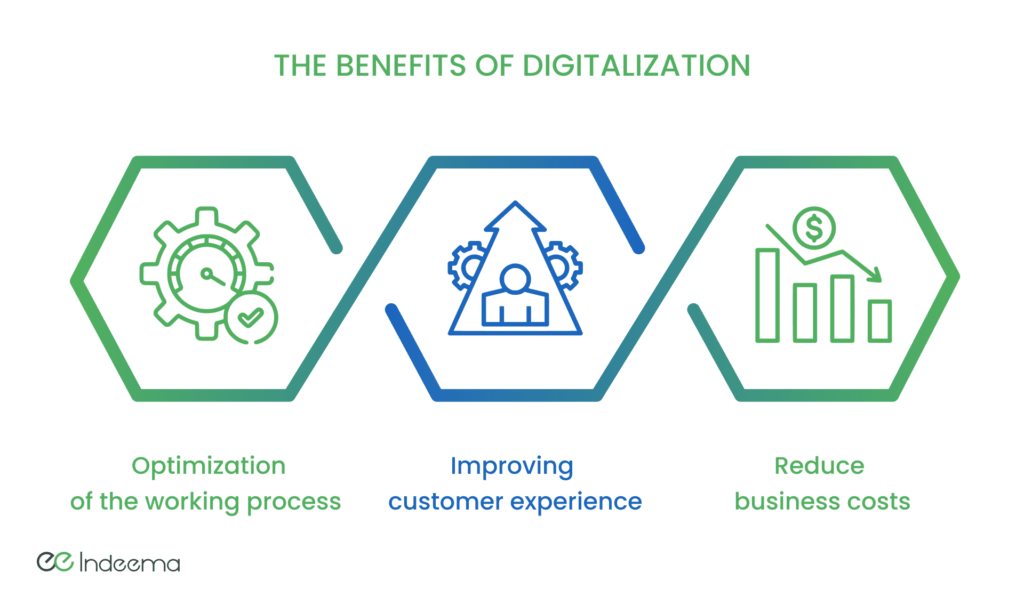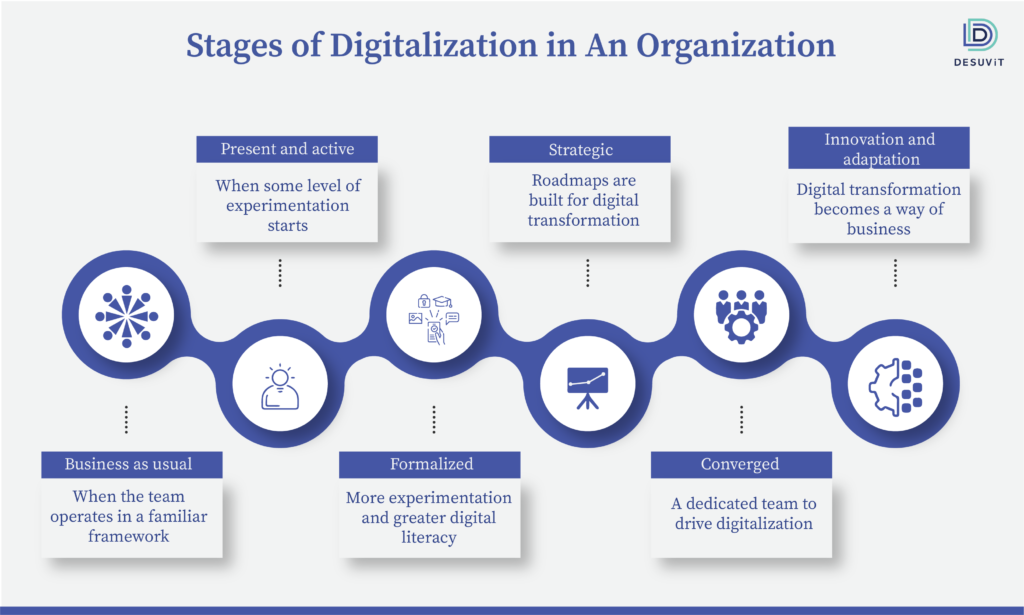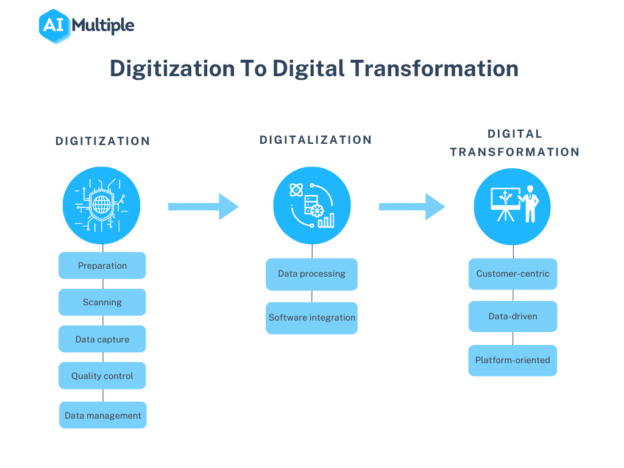If you’ve ever wondered why digitalization is such a big deal, you’re not alone. From transforming the way we work and communicate to revolutionizing entire industries, the importance of digitalization cannot be overstated. In this article, we will explore the reasons why digitalization has become a vital aspect of our lives, touching on its impact on businesses, individuals, and society as a whole. Whether you’re a tech enthusiast or simply curious about the digital revolution, this article will uncover the significance of digitalization and why it should matter to you.
Enhanced Efficiency and Productivity
In today’s fast-paced business world, organizations are constantly looking for ways to enhance their efficiency and productivity. Digitalization plays a crucial role in achieving this goal by streamlining processes, automating tasks, and improving data management.
Streamlining Processes
Digitalization allows businesses to streamline their processes by digitizing and automating various tasks. Instead of relying on manual and time-consuming methods, technology can be used to optimize and standardize workflows. This not only saves time but also reduces the chances of errors and inconsistencies.
For example, businesses can use digital tools to automate their invoicing process. Instead of manually generating, printing, and mailing invoices, businesses can now generate invoices with just a few clicks. This not only speeds up the process but also minimizes the risk of errors and helps businesses get paid faster.
Automation of Tasks
One of the key benefits of digitalization is the automation of repetitive and labor-intensive tasks. By automating tasks such as data entry, report generation, and inventory management, businesses can free up their employees’ time to focus on more strategic and value-added activities.
For instance, with the help of artificial intelligence and machine learning, businesses can automate customer support through chatbots. These chatbots can handle frequently asked questions, provide product recommendations, and even assist with order tracking. By automating customer support, businesses can provide a quick and efficient response to customer queries, leading to higher customer satisfaction.
Improved Data Management
Digitalization allows businesses to efficiently manage and analyze vast amounts of data. Through the use of digital tools and technologies, businesses can collect, store, and analyze data more effectively, leading to better insights and informed decision-making.
For example, businesses can leverage cloud-based data storage solutions to securely store and access their data from anywhere, at any time. This not only eliminates the need for physical storage infrastructure but also provides scalability, flexibility, and enhanced data security.
Increased Access to Information
In today’s information-driven world, having quick and easy access to relevant information is crucial for businesses to stay competitive. Digitalization enables businesses to access information more efficiently, regardless of geographical boundaries.
Quick and Easy Information Retrieval
Digitalization allows businesses to store and retrieve information with just a few clicks. Instead of searching through piles of papers or files, employees can now quickly find the information they need by searching through digital databases or using keyword searches.
For example, businesses can implement document management systems that allow employees to digitize and store documents in a centralized and searchable repository. This not only saves time but also eliminates the risk of losing important documents and improves collaboration among teams.
Global Reach
Digitalization has eliminated geographical barriers and opened up opportunities for businesses to connect with a global audience. Through the use of digital platforms and technologies, businesses can expand their reach and tap into new markets around the world.
For instance, e-commerce platforms enable businesses to sell their products or services globally without the need for physical stores. This allows businesses to reach customers in different countries and regions, leading to increased sales and revenue.
Improved Decision Making
Access to timely and accurate information is essential for making informed decisions. Digitalization provides businesses with real-time access to data and analytics, enabling them to make data-driven decisions and respond quickly to market changes.
For example, businesses can implement business intelligence tools that provide real-time dashboards and reports on key performance metrics. These tools can help businesses monitor sales, track inventory levels, and identify trends and patterns. By having access to this information, businesses can make informed decisions to optimize their operations and stay ahead of the competition.

This image is property of indeema.com.
Improved Communication
Effective communication is vital for businesses to collaborate, make decisions, and serve their customers efficiently. Digitalization offers several advantages in enhancing communication within organizations and with external stakeholders.
Real-time Collaboration
Digitalization has revolutionized collaboration by enabling real-time communication and collaboration tools. Businesses can now leverage platforms like video conferencing, instant messaging, and project management software to collaborate seamlessly, regardless of physical location.
For instance, teams can use platforms like Microsoft Teams or Slack to communicate and collaborate on projects in real-time. This eliminates the need for back-and-forth emails and allows teams to share ideas, discuss tasks, and make decisions more efficiently.
Remote Work Opportunities
The COVID-19 pandemic has accelerated the adoption of remote work, and digitalization has played a crucial role in enabling remote work opportunities. Businesses can leverage digital tools and technologies to allow employees to work from anywhere, at any time, without compromising productivity or collaboration.
For example, cloud-based project management tools and document sharing platforms enable teams to collaborate effectively, even when working remotely. This flexibility not only enhances work-life balance for employees but also allows businesses to tap into a global talent pool and reduce office space and infrastructure costs.
Enhanced Customer Communication
Digitalization has transformed the way businesses communicate with their customers. Through digital channels such as email, social media, and chatbots, businesses can provide personalized and efficient communication to their customers.
For instance, businesses can use email marketing campaigns to send personalized offers and updates to their customers based on their preferences and purchase history. This not only improves customer engagement but also increases the chances of repeat purchases and customer loyalty.
Cost Savings
Cost savings are a significant benefit of digitalization for businesses. By adopting digital technologies and reducing reliance on traditional methods, businesses can save money in various areas.
Reduced Paper Usage
Digitalization eliminates the need for paper-based documents and processes, resulting in significant cost savings. Businesses can transition to digital documents, forms, and contracts, reducing expenses associated with paper, printing, and storage.
For example, by implementing electronic signature solutions, businesses can eliminate the cost of printing, signing, and mailing physical documents. This not only saves money but also speeds up the signing process and improves overall efficiency.
Lower Storage Costs
Digitalization allows businesses to reduce the need for physical storage infrastructure, leading to lower storage costs. By digitizing documents, data, and files, businesses can store and retrieve information digitally, eliminating the need for physical filing cabinets or storage rooms.
For instance, businesses can use cloud-based storage solutions to store their data securely and access it whenever needed. This eliminates the need for physical servers and reduces costs associated with hardware maintenance and upgrades.
Minimized Operational Expenses
Digitalization can streamline processes and automate tasks, resulting in minimized operational expenses for businesses. By reducing manual labor and human error, businesses can save costs associated with employee salaries, training, and benefits.
For example, businesses can implement enterprise resource planning (ERP) systems that automate various functions such as inventory management, accounting, and human resources. This not only improves efficiency but also reduces the need for manual data entry and eliminates the risk of errors.

This image is property of www.desuvit.com.
Business Innovation
Digitalization presents opportunities for businesses to innovate and stay ahead in a competitive market. By embracing digital technologies, businesses can transform their operations, adapt to market changes quickly, and explore new revenue streams.
Digital Transformation Opportunities
Digitalization offers businesses the opportunity to undergo digital transformation, reimagining their processes, products, and services. By leveraging emerging technologies such as artificial intelligence, machine learning, and the Internet of Things, businesses can revolutionize their operations and create new value for their customers.
For instance, businesses can implement chatbots powered by artificial intelligence to provide personalized customer support and recommendations. This not only improves customer experience but also frees up employees’ time to focus on more complex tasks.
Agile Adaptation to Market Changes
Digitalization enables businesses to adapt quickly to market changes and customer demands. By leveraging digital tools and technologies, businesses can gather real-time data, analyze market trends, and make rapid adjustments to their strategies.
For example, businesses can use social media listening tools to monitor customer feedback, sentiment, and emerging trends. This helps businesses stay ahead of the competition by understanding customer preferences and adjusting their products or services accordingly.
New Revenue Streams
Digitalization opens up new opportunities for businesses to generate additional revenue streams. By exploring digital business models, partnerships, and platforms, businesses can tap into new markets and monetize their digital assets.
For instance, businesses can create online courses, e-books, or digital products that can be sold to a global audience. Additionally, businesses can leverage platforms such as Amazon or Shopify to sell their products or services online, reaching a wider customer base and generating additional revenue.
Enhanced Customer Experience
Digitalization has transformed customer experience, enabling businesses to provide personalized interactions, efficient customer support, and convenience and accessibility.
Personalized Interactions
Digitalization allows businesses to gather and analyze customer data, enabling personalized interactions. By understanding customer preferences, purchase history, and behavior, businesses can tailor their products, services, and marketing messages to individual customers.
For example, businesses can use customer relationship management (CRM) systems to track customer interactions and preferences. This allows businesses to provide personalized recommendations, offers, and discounts, enhancing the overall customer experience.
Efficient Customer Support
Digitalization has greatly improved customer support by enabling businesses to provide faster and more efficient assistance to their customers. Through the use of chatbots, self-service portals, and online support channels, businesses can address customer queries and issues in a timely manner.
For instance, businesses can implement chatbots on their websites or social media platforms to handle basic customer inquiries and provide automated responses. This not only reduces the response time but also allows customer support teams to focus on more complex issues, resulting in higher customer satisfaction.
Convenience and Accessibility
Digitalization has made it more convenient for customers to interact with businesses and access their products or services. Through digital platforms and mobile apps, customers can make purchases, track orders, and access information anytime, anywhere.
For example, businesses can develop mobile apps that allow customers to browse products, place orders, and make payments with just a few taps. This provides customers with the convenience of shopping on the go and enhances their overall experience with the brand.

This image is property of news.sap.com.
Data-driven Decision Making
Data-driven decision making has become a critical aspect of business strategy, and digitalization plays a key role in enabling businesses to access real-time analytics, improve accuracy, and identify trends and patterns.
Access to Real-time Analytics
Digitalization allows businesses to access real-time data and analytics, providing them with valuable insights into their operations, customers, and market trends. By leveraging digital tools and technologies, businesses can monitor key performance indicators and make data-driven decisions.
For example, businesses can use web analytics tools to track website traffic, user behavior, and conversions in real-time. This helps businesses analyze the effectiveness of their marketing strategies, identify areas for improvement, and optimize their online presence.
Improved Accuracy
Digitalization minimizes the chances of errors and improves the accuracy of data and information. By automating data entry and standardizing processes, businesses can reduce human error and ensure the reliability of their data.
For instance, businesses can implement barcode scanning systems in their inventory management process. By scanning barcodes, businesses can accurately track stock levels, reduce the risk of errors, and streamline their inventory management.
Identifying Trends and Patterns
Digitalization enables businesses to analyze large amounts of data and identify trends and patterns that can inform their decision-making process. By utilizing data analytics tools and techniques, businesses can uncover valuable insights and adjust their strategies accordingly.
For example, businesses can use data visualization tools to analyze sales data and identify trends in customer behavior. This helps businesses understand customer preferences, optimize their product offerings, and develop targeted marketing campaigns.
Optimized Performance Monitoring
Digitalization allows businesses to monitor and report on their performance in real-time, identify areas for improvement, and allocate resources efficiently.
Real-time Monitoring and Reporting
Digitalization enables businesses to monitor their performance in real-time through the use of digital dashboards and reporting tools. By tracking key performance indicators, businesses can identify issues or bottlenecks and take immediate action.
For example, businesses can implement project management software that provides real-time visibility into project milestones, timelines, and resource allocation. This allows project managers to monitor progress, identify risks, and make necessary adjustments to ensure project success.
Identification of Areas for Improvement
Digitalization provides businesses with valuable insights into their operations, allowing them to identify areas for improvement. By analyzing data and performance metrics, businesses can identify inefficiencies, bottlenecks, and areas that require optimization.
For instance, businesses can use business process management (BPM) tools to map and analyze their processes. This enables businesses to identify areas of redundancy, streamline workflows, and improve overall efficiency.
Efficient Resource Allocation
Digitalization enables businesses to allocate resources more efficiently by providing visibility into resource utilization and demand. By analyzing data on resource availability and requirements, businesses can optimize their resource allocation and reduce waste.
For example, businesses can use resource management software to track and manage their workforce effectively. By understanding employee availability, skills, and project requirements, businesses can assign resources more effectively, leading to improved productivity and cost savings.

This image is property of research.aimultiple.com.
Competitive Advantage
Digitalization offers businesses a competitive advantage by enabling them to differentiate themselves in the market, adopt emerging technologies, and improve their speed to market.
Digital Transformation as a Market Differentiator
Digitalization allows businesses to differentiate themselves from their competitors by embracing digital transformation. By leveraging digital technologies and capabilities, businesses can offer unique and innovative products, services, and customer experiences.
For example, businesses can implement augmented reality (AR) or virtual reality (VR) technologies to provide immersive and interactive experiences for their customers. This not only sets them apart from competitors but also enhances customer engagement and satisfaction.
Adoption of Emerging Technologies
Digitalization enables businesses to adopt and leverage emerging technologies to stay ahead of the curve. By embracing technologies such as artificial intelligence, machine learning, blockchain, and the Internet of Things, businesses can innovate and create new value for their customers.
For instance, businesses can use machine learning algorithms to personalize product recommendations based on customer preferences and behavior. This enhances the customer experience, increases sales, and positions the business as a leader in adopting emerging technologies.
Improved Speed to Market
Digitalization allows businesses to bring products and services to market more quickly and efficiently. By streamlining processes, automating tasks, and leveraging digital tools, businesses can reduce time-to-market and gain a competitive edge.
For example, businesses can leverage cloud computing infrastructure to deploy and scale their applications quickly. This eliminates the need for physical infrastructure setup and configuration, allowing businesses to launch new products or features faster.
Resilience and Business Continuity
Digitalization plays a crucial role in ensuring resilience and business continuity for organizations. By implementing backup and recovery solutions, reducing dependence on physical infrastructure, and enabling seamless remote operations, businesses can withstand disruptions and recover quickly.
Backup and Recovery Solutions
Digitalization allows businesses to implement robust backup and recovery solutions to protect their data and systems from potential disasters or disruptions. By leveraging cloud-based backups and disaster recovery solutions, businesses can ensure the availability and integrity of their critical data.
For example, businesses can automatically back up their data to secure cloud storage on a regular basis. In the event of a system failure or data loss, businesses can quickly restore their data and resume operations without significant downtime or loss of productivity.
Reduced Dependence on Physical Infrastructure
Digitalization reduces businesses’ dependence on physical infrastructure, making them less vulnerable to disruptions caused by natural disasters, power outages, or other unforeseen events. By leveraging cloud computing, virtualization, and remote access technologies, businesses can continue their operations seamlessly even during disruptions.
For instance, businesses can move their applications and data to the cloud, eliminating the need for on-premises servers and infrastructure. This allows employees to access their work remotely, ensuring business continuity in the face of disruptions.
Seamless Remote Operations and Disaster Recovery
Digitalization enables businesses to establish seamless remote operations and enables efficient disaster recovery plans. By leveraging technologies such as virtual private networks (VPNs), video conferencing, and collaboration tools, businesses can ensure that employees can work remotely and collaborate effectively even during disruptions.
For example, businesses can implement VPNs to securely connect remote employees to the organization’s network. This allows employees to access business-critical applications, files, and systems, ensuring business continuity and productivity during disruptions.
In conclusion, digitalization is of utmost importance for businesses in today’s rapidly changing and competitive landscape. It enhances efficiency and productivity through streamlined processes, task automation, and improved data management. Increased access to information enables quick and easy retrieval, global reach, and improved decision-making. Improved communication fosters real-time collaboration, remote work opportunities, and enhanced customer communication. Cost savings are achieved through reduced paper usage, lower storage costs, and minimized operational expenses. Digitalization also drives business innovation, enhances customer experience, enables data-driven decision-making, optimizes performance monitoring, and provides a competitive advantage. Additionally, digitalization ensures resilience and business continuity through backup and recovery solutions, reduced dependence on physical infrastructure, and seamless remote operations and disaster recovery. Embracing digitalization is crucial for businesses to thrive in the digital age and remain competitive in the market.

This image is property of i0.wp.com.
